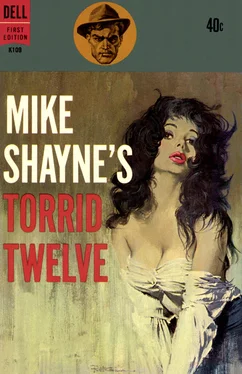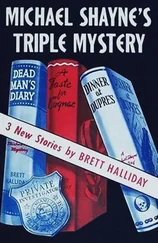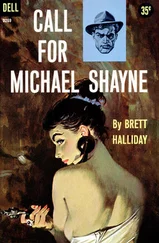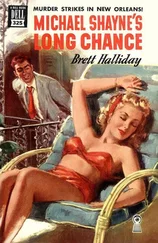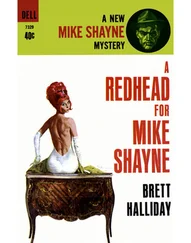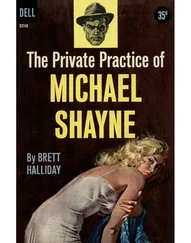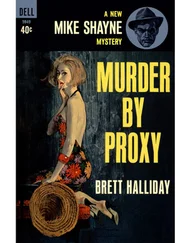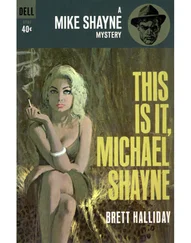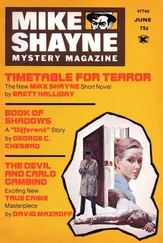Brett Halliday - Mike Shayne's Torrid Twelve
Здесь есть возможность читать онлайн «Brett Halliday - Mike Shayne's Torrid Twelve» весь текст электронной книги совершенно бесплатно (целиком полную версию без сокращений). В некоторых случаях можно слушать аудио, скачать через торрент в формате fb2 и присутствует краткое содержание. Город: New York, Год выпуска: 1961, Издательство: Dell Publishing, Жанр: Детектив, на английском языке. Описание произведения, (предисловие) а так же отзывы посетителей доступны на портале библиотеки ЛибКат.
- Название:Mike Shayne's Torrid Twelve
- Автор:
- Издательство:Dell Publishing
- Жанр:
- Год:1961
- Город:New York
- ISBN:нет данных
- Рейтинг книги:3 / 5. Голосов: 1
-
Избранное:Добавить в избранное
- Отзывы:
-
Ваша оценка:
- 60
- 1
- 2
- 3
- 4
- 5
Mike Shayne's Torrid Twelve: краткое содержание, описание и аннотация
Предлагаем к чтению аннотацию, описание, краткое содержание или предисловие (зависит от того, что написал сам автор книги «Mike Shayne's Torrid Twelve»). Если вы не нашли необходимую информацию о книге — напишите в комментариях, мы постараемся отыскать её.
Mike Shayne's Torrid Twelve — читать онлайн бесплатно полную книгу (весь текст) целиком
Ниже представлен текст книги, разбитый по страницам. Система сохранения места последней прочитанной страницы, позволяет с удобством читать онлайн бесплатно книгу «Mike Shayne's Torrid Twelve», без необходимости каждый раз заново искать на чём Вы остановились. Поставьте закладку, и сможете в любой момент перейти на страницу, на которой закончили чтение.
Интервал:
Закладка:
“All right, Richard. Have a good trip.”
“Thank you, dear. Take care of yourself and, above all, don’t worry that beautiful head of yours about trifles. Just relax. Let me do all the worrying.”
They kissed, warmly. Then he picked up his suitcase and went down the driveway to the garage. It was a fact, he reflected, that all the worrying was left to him. Marion probably did not appreciate just how much worry there was.
Neither did Bernice, nor Lucille, nor Helen — none of them. But, under the circumstances, he couldn’t ask, he couldn’t even hint, at the credit he really deserved for the many detailed responsibilities he bore.
However, these added cares were not too heavy — they were hazards of his career. Backing his coupé down the driveway, Richard’s moodiness was already gone. In front of the house, he looked up and waved to Marion, now standing in the open doorway, her striking figure undimmed by a simple house-dress. She waved affectionately in return.
His was a full, engrossing life, he decided as he drove along. Some people might even think it fascinating, if not too much so, imagining it filled with dreadful risks. There was a small element of danger, of course. But this only added zest. It offered the faint, tang-laden pinch of adventure, without which, really, his regulated life would be unbearably placid. It was long since far too well rehearsed.
2
Three hours later, shortly before noon, Richard C. Brown passed temporarily out of existence.
The loss of identity required less than a minute. It took place in a busy railroad checkroom in Philadelphia. It required only the time to check in his salesman’s sample-case and order-book — Speedie Sandwich Co., Automatic Cutters, Precision Knives. Then all that was needed was to take out a similar sample-case and order-book for his next incarnation, as a salesman of cosmetic novelties.
He had entered the checkroom in the name of Richard C. Brown. Under that name, he had actually made three lackadaisical stops at three widely separated restaurants that morning. At one of them, he had actually been forced to make a sale, as his order-book showed.
When he came out of the checkroom, he was Robert D. Brown. In that identity, he would make two or three torpid calls at drugstores during the afternoon, plus a few more during the next three days. That was part of the schedule — the most tiresome part, of course. It was a waste of time. But it was time indispensably given up, he felt, to protect his best interests in so many roles.
The business concerns for which he sold — or, at any rate, with whose products he traveled — were small and specialized. No high-pressure salesmen competed for their exclusive territorial rights. The owners of these companies might wonder what type of paralysis afflicted the slow-motion Brown, but, from their standpoint, paying him only on a commission basis, even a few sales were better than none.
As for Mr. Brown, he had other fish to fry. Far more important matters demanded his time and intelligence.
As always, when he made the change from one identity to another, he paused before the first mirror that caught his eye. The hesitation was brief, hardly more than a flicker — it was as though he half expected to find revealed, literally, a new and totally different man. It was as if he expected to see features even more forceful and magnetic, if that were possible, than they had been before.
This time, the mirror was a rectangle in a vending machine. Robert was a little disappointed that the reflection showed no marked change. His face, in spite of its forcefulness, was smooth, oval, a little asymmetrical, just as Richard’s had been. The magnetic eyes that peered back at him from beneath wisps of sandy eyebrows were still pale-blue and gray, much like those of an alert rooster. Even the hair — he removed his hat to make sure — was a downy pink, and still scarce.
Robert D. looked like Richard C. He also looked like Raymond A. Brown of Hartford, and Reynold B. Brown of Boston. In any identity, for that matter, he knew that he resembled a great many men people find it hard to remember.
Then what made him so irresistible to women?
Robert shrugged, puzzled but complacent, and moved away. Probably, he decided, when he stared hard at himself in the mirror, his inner personality simply went into aloof, sensitive retirement.
It was convenient, of course, that his appearance was not too remarkable. It was much, much safer, to be inconspicuous. He looked like any respectable, married, thirty-nine-year-old businessman, hard-working and moderately successful — and why shouldn’t he? The description was true.
There was only one detail in this picture of himself that did not quite satisfy him. His success, in a highly speculative investment field, was far too moderate. At least, it had been thus far, in the fifteen years since his first marriage, when Lucille’s financial assets gave him the means to begin dealing on a large scale in his favorite securities.
The securities he bought were betting slips, in the horse-racing market. Brown — all four of him — did not exactly play the horses. It had long ceased to be play. He studied, he computed, he doped according to the rules of his system, and then made shrewd investments. It was full-time employment, too. No system is so perfect it can’t be improved, he often told himself, after which, he set about computing and doping some more, seeking to plug up all possible leaks, leaks that stubbornly reappeared in his formulae.
On his way to lunch, the real start of his business day, he bought every form-sheet and newspaper with information about the fluctuations that would take place that afternoon, as soon as the tracks opened. In the quiet restaurant where he dined, he was a familiar figure, with his charts, his notes, his record-books.
The waitress who set his place asked him, “Feeling lucky today, Mr. Brown? I could certainly use a long shot, myself, if you’ve got something sure.”
Questions like this made him wince, inwardly, as hopelessly amateurish. How could anyone speak of luck, a long shot and a sure thing, all in the same breath? But he smiled amiably and tried not to sound condescending.
“Maybe. If I find something really hot, I’ll let you know.”
But the waitress scarcely heard him, her mind skipping ahead on a more facetious tangent. “What I wonder about customers doping the horses. Well, maybe you can. But I’d like to see you try something tough, like making book on people. Be honest, Mr. Brown, sometimes you can’t even figure your own wife.”
Brown began a firm reply. “On the contrary,” he said, and then just as firmly stopped.
Without even asking, or caring, which wife the waitress had in mind, the subject was taboo. It was a sore point, besides. He had been about to state that just the opposite was true. His wives ran true to form, he had found, and he only wished — how deeply and painfully he wished! — he could say the same for horses.
But the subject was too distressing to talk about. It would be unwise to speak with too much authority. By this time, the waitress had given him a menu, and gone.
It was a fact, though — and a sad one — that, as Raymond A. Brown, he had suffered reverses in his first two years of marriage with Lucille, and they had cost him nearly all of the $27,000 with which she had opened their joint bank account. Joint bank accounts, like joint ownership of property, Brown regarded surely among man’s finest inventions. There had been a dark period when, if Lucille had thoughtlessly written a check, it was quite possible that their marriage might actually have exploded.
Fortunately, he had grown very fond of a new and recently widowed acquaintance, a lady well worthy of becoming his wife. This was Helen, and she had brought a comfortable $40,000 to her joint bank account with Reynold B. Brown. The name, like the initial, was chosen as an orderly help to Brown’s memory — at that time, he had had no intention of working his way through the alphabet. So, with Helen’s unconscious but timely backing, he had recapitalized and refinanced all around. Naturally, of course, he had devoted his own added insight toward a few final, vitally necessary improvements in the system.
Читать дальшеИнтервал:
Закладка:
Похожие книги на «Mike Shayne's Torrid Twelve»
Представляем Вашему вниманию похожие книги на «Mike Shayne's Torrid Twelve» списком для выбора. Мы отобрали схожую по названию и смыслу литературу в надежде предоставить читателям больше вариантов отыскать новые, интересные, ещё непрочитанные произведения.
Обсуждение, отзывы о книге «Mike Shayne's Torrid Twelve» и просто собственные мнения читателей. Оставьте ваши комментарии, напишите, что Вы думаете о произведении, его смысле или главных героях. Укажите что конкретно понравилось, а что нет, и почему Вы так считаете.
